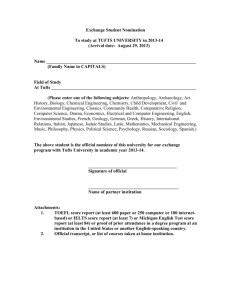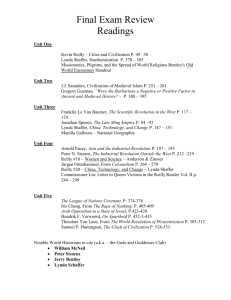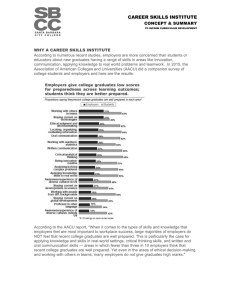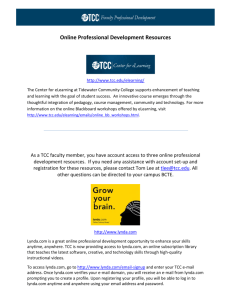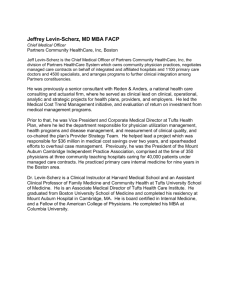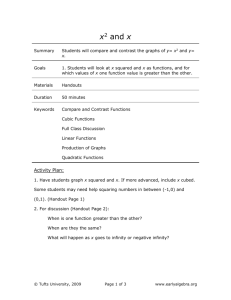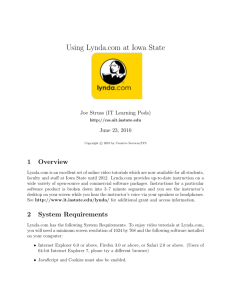Lynda Shaffer - Tufts University
advertisement
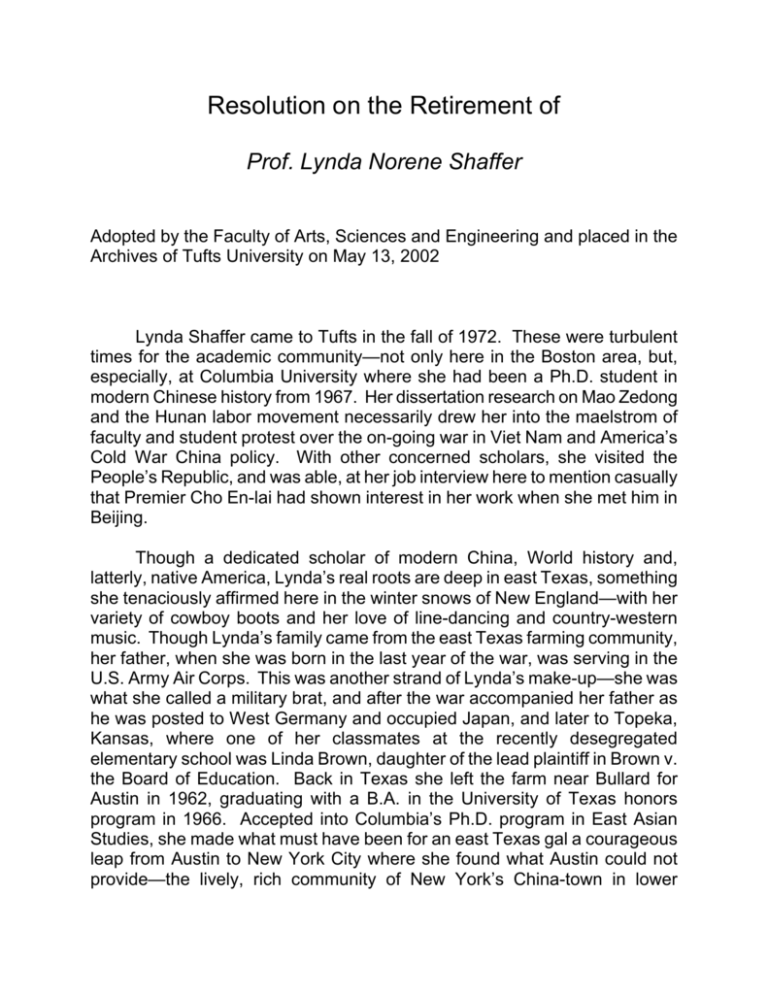
Resolution on the Retirement of Prof. Lynda Norene Shaffer Adopted by the Faculty of Arts, Sciences and Engineering and placed in the Archives of Tufts University on May 13, 2002 Lynda Shaffer came to Tufts in the fall of 1972. These were turbulent times for the academic community—not only here in the Boston area, but, especially, at Columbia University where she had been a Ph.D. student in modern Chinese history from 1967. Her dissertation research on Mao Zedong and the Hunan labor movement necessarily drew her into the maelstrom of faculty and student protest over the on-going war in Viet Nam and America’s Cold War China policy. With other concerned scholars, she visited the People’s Republic, and was able, at her job interview here to mention casually that Premier Cho En-lai had shown interest in her work when she met him in Beijing. Though a dedicated scholar of modern China, World history and, latterly, native America, Lynda’s real roots are deep in east Texas, something she tenaciously affirmed here in the winter snows of New England—with her variety of cowboy boots and her love of line-dancing and country-western music. Though Lynda’s family came from the east Texas farming community, her father, when she was born in the last year of the war, was serving in the U.S. Army Air Corps. This was another strand of Lynda’s make-up—she was what she called a military brat, and after the war accompanied her father as he was posted to West Germany and occupied Japan, and later to Topeka, Kansas, where one of her classmates at the recently desegregated elementary school was Linda Brown, daughter of the lead plaintiff in Brown v. the Board of Education. Back in Texas she left the farm near Bullard for Austin in 1962, graduating with a B.A. in the University of Texas honors program in 1966. Accepted into Columbia’s Ph.D. program in East Asian Studies, she made what must have been for an east Texas gal a courageous leap from Austin to New York City where she found what Austin could not provide—the lively, rich community of New York’s China-town in lower Manhattan. Years later she would instruct friends visiting the City from New England just where to go for the best Chinese food, and just what pastries to bring back from her favorite Chinese bakery. Five years’ immersion in New York life and the Chinese language made for a curious amalgam—something of the laconic Texan, overlaid with a New Yorker’s savvy city-smarts, and an ability to surprise waiters by ordering in Chinese at Asian restaurants. Lynda was hired in the History Department at Tufts as an instructor, pending completion of her Ph.D. The dissertation, later published as Mao and the Workers, was defended in 1974, and she became an assistant professor responsible for all of Asian history at Tufts—not only China from several millennia before Mao to the present, but also the histories of Korea and Japan. Tenured and promoted to associate rank in 1979, she had become convinced that Tufts students needed to learn about non-Western peoples, not as exotics or as an under-developed “third world,” but on their own terms and from their own historical and cultural perspectives. Doubtless Austin, with its South-Central Texas Latino ambience, as well as her family’s blood connection with the Cherokee people worked to reinforce these sympathies with African and Asian peoples who, she fiercely maintained, had been often deprived of a real history by university curricula that remained grounded in a European/American tradition. For several years she was an active member of the Tufts E.E.O.C., and in the 1970s and ‘80s was a prominent supporter and mentor for Asian-American and Asian-Pacific-American students. Within the department Lynda successfully fought to maintain and expand our commitment to a broad regional coverage beyond America and Europe. During the Mayer years the department was able to grow, and she was instrumental in ensuring that many of these new hires were in African, Asian and Middle Eastern history. At the same time, Lynda’s own publishing and teaching interests shifted toward collaborative “World History,” and she was one of the founders of the world history professional organization. In the mid-eighties she corralled many of us into a large project to develop a world history course, while exploring in her own published work issues as diverse as “Medieval History with a Global Perspective,” “Native Americans and World History,” “The Hemispheric Roots of the Columbian Voyages,” and “Differences in the Histories of the Peoples of the Eastern and Western Hemispheres Prior to 1492.” In the summer of 1986 Lynda became the first Scholar in Residence at Talloires. At the time she was evolving the idea of a World curriculum within the department into a major experiment in collaborative World Civilizations core courses for the university as a whole. The next year it was largely due to her effort that Tufts was awarded a $400,000 NEH grant for the development of core courses in World Civilizations. Over the following half-decade Lynda devoted herself tirelessly to this project which came to fruition in a series of university courses designed with the help of Professors Hirsch, Rosenmeier, Clark and Solomon. In the 1990s Lynda further developed her own research and publishing interests in fields far removed from Mao and the Workers. Her investigation of Asian medieval trade and oceanic migration led, first, in 1994, to an article in the Journal of World History on “Southernization,” a riposte to “Westernization” that was conceptually path-breaking and widely influential. Two years later her book on Maritime Southeast Asia before 1500 appeared. But it was pre-Columbian native American culture that became her special avocation as she threw herself into a personal discovery of the archeological remains of mid-North American mound-building peoples with a relish. Her book, Native Americans Before 1492: The Mound-Building Centers of the Eastern Woodlands, was published in 1992. The dazzling range of scholarly exploration and the great fertility of imagination suggested by these works had its final focus, here at Tufts, in the big project of the past six years—this time involving pre-colonial West Africa and the great Sundiata epic which is to be presented on interactive CD-ROM. This ambitious project, pursued over many years with the tireless help of her principal research assistant and World History Ph.D., Parker James, will bring history, culture, social and physical geography, music and poetry together in what promises to be a real tour de force. Promoted to full professor in 1995, two years later she won another large NEH grant ($190,000) for developing this remarkable teaching tool, and the same year was given Tufts University’s Outstanding Faculty Award. Lynda Shaffer will, back at the house she is building on that east Texas farm, continue to be an active scholar, with a half-dozen projects competing for attention with her famous love of gardening. Here at Tufts students and faculty friends will miss those long late afternoon hours in her cavernous office in the basement of East Hall where, amid the two or three air purifiers that labored to remove the clandestine cigarette smoke, the welter of papers and filing cabinets and objects—the huge painted pot from Senegal, the somewhat deflated over-sized plastic globe, and the hand-woven textiles—she dispensed her sagacious, shrewd observations about history, politics, food, and the world going to hell in a hand-basket, but also her remarkable, twinkling—often mischievous—sense of humor. On behalf of the committee, I move that this resolution on the retirement of Lynda Noreen Shaffer be spread on the permanent record of this faculty and that a copy of it be sent to her. Presented by Prof. Howard Solomon Committee Howard L. Malchow Howard M. Solomon Jeanne Marie Penvenne
